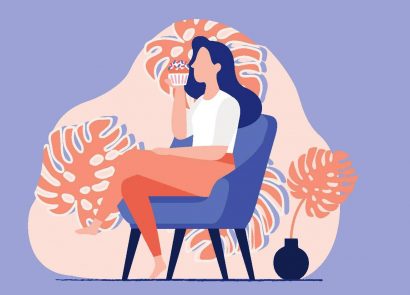For many people, the very word ‘alone’ can conjure up a fear of isolation, or a sense of being left out, but for others, being alone can be rewarding, fruitful and even enjoyable. Whether you’re going through a divorce, saying farewell to children leaving home, or are struggling to settle into WFH life without having your colleagues around, there are points in our lives where we’re all going to feel the sharp pang of being left with our own thoughts. So, how can we learn to lean into the feeling and enjoy time spent by ourselves? To give you a hand, we’ve put a plan together (with the help of the experts) to make falling in love with your own company, an easy ride.
Solo self-growth
“Learning to be alone, and to enjoy your own company, is such an important skill for two main reasons,” says Francesca Specter, journalist, podcast host and author of Alonement: How to be alone and absolutely own it. “Firstly because, just like quality time with others, quality time with ourselves is one of the cornerstones of our overall wellbeing – and has distinct benefits you don’t tend to get from being alone.” While having a calendar full of social dates might look good on paper, and even appear envious to other people, it’s important we make room for dates with ourselves, too. “Many of us know anecdotally that it’s important to balance both – but it was driven home by research conducted last year by Bar-Ilan University, where psychologists found solitude and socialising hold distinct, important benefits for our personal growth,” explains Francesca. “The study focused on solitude for pursuing ’self-selected leisure activities’, (in other words, the things we as individuals enjoy in our spare time, such as reading), while socialising was more conducive to focusing on the present and being in the moment. Being alone is also a great time for self-care (because you don’t need to think about other peoples’ needs), and personal growth activities such as meditation or journaling (because you’re not distracted, or worried someone’s looking over your shoulder). It’s also particularly important if you’re a carer, for instance, for young children – being able to value regular time for yourself, even if it’s only 15 minutes you get a day, allows you to give back more to others, without resentment because you’ve met your needs in some way.”
Positive solitude
With research indicating that many of us actually benefit from being by ourselves, why are we so keen to schedule in time spent with other people? Dr Meg Arroll, a chartered psychologist (healthspan.co.uk), has the answer: “Over-scheduling or constant phone use can be a sign of high-functioning anxiety, as these are ways to escape and distract oneself. Therefore, if you feel uncomfortable being on your own, it is worth digging below the surface and examining the thoughts and feelings that being in the presence of others keep at bay. Solitude is like any other skill so if you are out of practice, build up gradually by setting even a few minutes to be completely by yourself each day. By spending time alone and becoming comfortable with yourself, you’ll have the mental strength to make decisions without external influences and develop as the person you truly are. This, in turn, can improve relationships with others as you will be more grounded within a profound sense of self.” Francesca coined the term ’positive solitude’ as a skill gained over time and something to continually work at to boost your resilience. “The second reason learning to enjoy your own company is important is that, the odds are, you will at some point experience an extended period of time alone,” says Francesca. “That could be simply when your partner goes away on a week-long work trip, or a longer period for instance after a break-up, divorce or bereavement that finds you living alone. There is happiness and growth to be found in these periods – but only if you have first learnt that being alone can be a positive experience. Positive solitude – or alonement – is a skill you acquire over time, and practice makes perfect. That’s not to say you’ll want to be alone at the expense of your other relationships in your life, by the way – often, alonement tends to complement, rather than compete with, our relationships with others.”
Take their word for it
Feeling comfortable being alone is a hot topic right now, so here are some of the latest books to draw inspiration from
Alonement: How to be alone and absolutely own it by Francesca Specter (Quercus, £4.49).
“I wrote my book in 2019, alongside a personal journey where I was learning, for the first time in my life, to spend time comfortably alone” says Francesca. “Before that, I was an extreme extrovert who couldn’t stand even an hour in my own company, and would do anything to avoid it. After a break-up in my late 20s, in November 2018, which found me living alone for the first time in my life, I realised that my avoidance of alone time wasn’t sustainable. As a personal journey, alonement – a word I invented because I could find no other word describing alone time as an objectively positive experience – was a plan B. But, six months into my personal journey, my confidence and sense of self soared, as did the strength of my relationships with other people.”
A Trip of One’s Own: Hope, Heartbreak and Why Travelling Solo Could Change Your Life by Kate Wills (Blink Publishing, £10.25)
Finding herself going through a divorce after less than a year of marriage, Kate Wills is desperately in need of an escape. While her job as a jet-setting travel journalist allowed her to do just that, it isn’t until she starts to look to the past, that she uncovers the meaning of breaking expectations. From a nun to a globe-girdling cyclist, Kate discovers throughout time, many women have found joy in solo adventures.
What a Time to be Alone: The Slumflower’s Bestselling Guide to Why You Are Already Enough by Chidera Eggerue (Quadrille Publishing Ltd, £10.25)
Learn how to navigate the modern world with Chidera Eggerue, life guru and confidante. She’ll show you that being alone is not just OK: it could be the best thing to ever happen to you. Chock-full of insightful advice from Chidera’s Nigerian mother and full of her own original artwork, use this book as a manual to live the best version of your life.
4 ways to factor in your ‘alone’ time
- “Take a 20-minute soak in a bathtub, or sit on a bench with a coffee for 15 minutes and just notice how it feels,” says Dr Madeleine Mason Roantree, psychologist at The Vida Consultancy (thevidaconsultancy.com). “Give yourself permission to not do anything. Then ’graduate’ to a larger amount of time. Take an hour out of your week where you do something on your own without the distraction of others (and your phone). Read a book, listen to music, go for a random walk about town or simply ’do nothing’; lie on your bed and daydream, sit under a tree and watch the day go by.”
- “Reconnect with your authentic self,” says Dr Audrey Tang, a chartered psychologist, mental health and wellness expert and author of The Leader’s Guide to Resilience, ( Pearson, £14.99). “We all spend a lot of time performing adaptive roles, whether that be professional, partner, child and so on, but being on your own allows you to touch base with who you are and what you love.”
- “Go to the cinema on your own or have a meal out by yourself,” says Dr Roantree. “Tap into the positive sensations of spending time with yourself. Find the feelings joy in solitude. If you are already well versed in doing these sorts of things, but never get round to it, try and find a natural lull in your week and dedicate that to some alone time. See if you can build some time into your weekly routine. You will likely have a favourite alone-time activity. Resurrect this into your week.”
- “Seek the company of a great author or a film you’ve been wanting to see,” says Dr Tang. “A leisurely lunch can be savoured alone – it is only social convention that seems to suggest we do things as a couple or group.”
Are you really an introvert?
Convinced yourself that you’re an extrovert who ’needs’ other people’s company? Don’t be so hasty, as Dr Tang explains why it isn’t as simple as that. “A word on introversion and extroversion may be of use here,” says Dr Tang “The terms ’introversion’ and ’extroversion’ are colloquially understood as ’extroverts are outgoing and introverts are quiet loners’. This – albeit common – misunderstanding is an oversimplification of psychoanalyst Carl Jung’s original approach. According to Jung these two concepts are attitudes – ’Each person seems to be energised more by the external world (extroversion) or the internal world (introversion)’.”



















